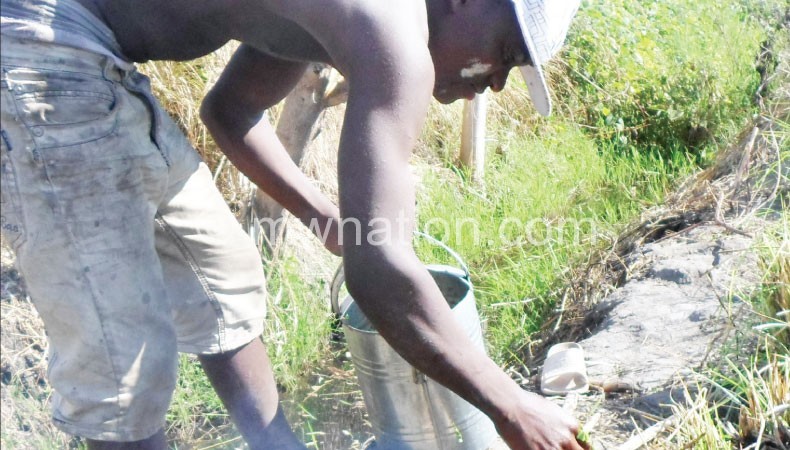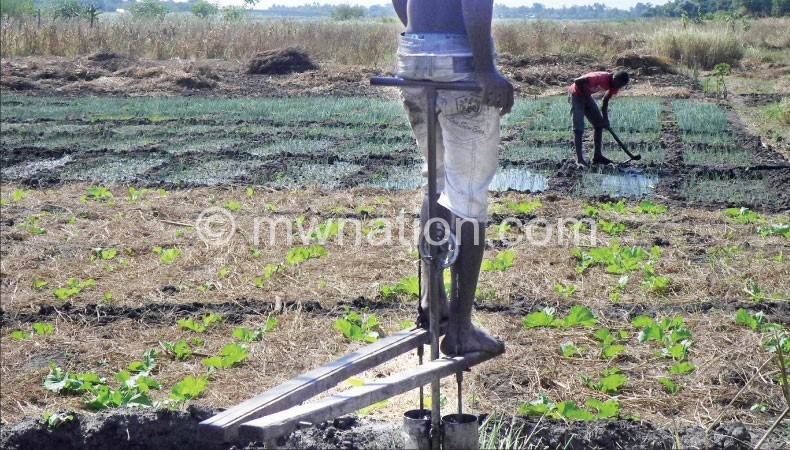Dumping fish nets for treadle pumps

Frank Lemani, 22, and his 19-year-old brother, Adam, were introduced into the fishing business before they celebrated their sixth birthdays.
Their father, John Lemani, was a successful fisherman in Mwenyama Village in the area of Traditional Authority (T/A) Mponda in Mangochi.
Just like any loving parent would do, he taught his sons the trade while they were still young so that they could grow with it.
“Fishing was a lucrative business in those days. Imagine young as we were, having thousands of kwacha to spend on anything we wanted from a single fishing expedition,” recounted Frank.
And as fishing boomed in 2004, the two brothers agreed to drop out of school so that they could concentrate on the trade.
“We thought that we could do without education. So, we felt there was no need to waste our time staying in school when we could get all we needed through the nets,” explained Adam.
Their joy was, however, not long-lasting. In 2006, the duo started to register a decline in the amount of fish catch due to a number of factors, chief among them being the pressure locals exert on the lake.
Most families in Mangochi do not have sustainable means of earning a living, apart from fishing.
It is, therefore, difficult for them to stay off the lake for a month or two to give room to the fish to breed and grow.
This has resulted in the declining amounts of fish being caught in Shire River and Lake Malawi.
This is not unique to Malawi. A latest study conducted by the University of California Santa Barnaba indicates that fish stocks across the globe are declining faster than feared, with the smallest fisheries faring worst.
The study also discovered that more than half of fisheries worldwide face shrinking stocks, leading to huge economic losses to the individuals, families as well as nations.

Food insecurity, lack of alternative sources of living, [human] overpopulation and climate change have been singled out as major contributors to the declining fish stocks in rivers and lakes.
A fisherman based at M’baluko in the area of Traditional Authority Chowe, Hussein Ajib, confessed that he has on several occasions gone home empty-handed even after spending sleepless nights on the waters.
“And that’s the most painful experience to a fisherman because we depend on fish for our daily livelihood. We can’t feed our families if we catch none or less fish in a day,” explained Ajib, head of seven-member family.
Frank disclosed that perennial hunger, the unsustainability and unpredictability of the fish industry motivated him and his brother to dump fish nets for a hoe.
The two joined Laini Irrigation Scheme located at the tip of M’baluko Village. And since then, the duo has never looked back.
“We’re, in fact, working towards expanding so that we could be realising more benefits from the scheme,” explained Frank.
Government [has] set irrigation as one of its top priorities, and an irrigation programme, jointly supported by the International Fund for Agriculture and Development (Ifad) and the World Bank, was launched in 2006 to tackle the issue.
The objective of the programme, Irrigation, Rural Livelihoods and Development Project (IRLADP) is to raise agricultural productivity and net incomes of poor rural households by providing an integrated package of support covering irrigation, agricultural and irrigation advisory services, marketing and post-harvest assets and services.
This notwithstanding, irrigation remains scarcely developed and the few large-scale government irrigation schemes have been neglected and fallen into disrepair.
As a result, agricultural productivity has been so low and production erratic that Malawi registered one of the worst food crises in history in 2012.
The World Food Programme (WFP) singled out the country’s overreliance on rain-fed agriculture and support from the international community as some of the major contributing factors.
WFP said the crisis could have been averted if government and the private sector had invested a lot of resources in irrigation farming.
The organisation argued that while foreign aid is critical in feeding the hungry and reviving agriculture, food security is too important to be left to the generosity of external partners.
“Food security requires the same seriousness and resources as national security, if not more. In fact, national security loses its legitimacy if thousands of citizens die not from enemy firepower, but from starvation,” emphasised WFP.
Former Minister of Irrigation and Water Development, Anita Kalinde, concurred with the observation when she disclosed that the country is currently irrigating 97 000 of the 600 000 hectares of irrigable land, leaving vast acreage of land lying idle.
Speaking during the opening of a hands-on training in irrigation development management best practices for officers in the ministry in April 2014, Kalinde said irrigation farming has the potential to turnaround not only the food situation, but also the economic [mis]fortunes of most families.
“Malawi could have maximised benefits from irrigation farming even if the country had utilised all or half of the irrigable land. The advantage of irrigation farming is that it is sustainable unlike other sources of income such as fishing,” she stated.
Frank and Adam bore testimony. The duo divides a year in four growing seasons. Each season earns them about K150 000.
“As we’re talking to you, we’ve just finished buying iron sheets and bricks for our parents’ house. This couldn’t happen if we were still in the fish industry,” said Adam.
But Frank criticised policymakers and politicians for paying lip service to this important industry, arguing government is not making significant investment in the irrigation sector.





